Temps en Je, tu, il ...elle (par Chantal Akerman)
The following entry is for the Unspoken Cinema Blogathon..
Enjoy, folks...
If you've never had the chance to experience an Akerman film, especially this one, then you have missed out on a rare chance to glimpse both a fine madness and a stark honesty about the human experience at once. Without spoiling it for anybody, the film exists in three parts defined by locale and the relationship of the character (who feels often more a subject than a person) with the viewer, the setting and the other two characters in the film -- from whom, remarkably, we derive less of the subtext than we do from the filmmaker herself in the lead role. In the first part, she exists in a room that she empties of its furniture to make larger, writing and writing a letter so rambling and long that it is to the world of love letters what Berlin Alexanderplatz is to the world of fictive film. Living on powdered sugar and clothes that are more often off her than on, we witness her unobstructed expression of the deprivation and self-isolation that love can manifest in us.
Akerman's great pains to occlude our sense of time during this first third acts as one of the great boons of contemplative cinema. In a way, it is more real than "real time" because when faced with any kind of suffering or challenge, we so often seek refuge in some amount of disorientation. At times, she narrates her own actions in the room before she has enacted them; sometimes, after. Either way, the suggestion adds a great layer to this film of feminist deconstruction, this cinematic act of contemplation. By asking us to watch and listen out of sync, the film achieves its intended effect as a piece of contemplative cinema -- or, what the natives are calling CC these days -- because, less important, her actions retain their sense of survival and grubby familiarity without overshadowing the suspension of disbelief.
Within that suspension of disbelief, the filmmaker works her magic. Her state of mind and emotions are not obvious or even alluded to; her purpose (whether for being in the room or on this earth at all) is not mentioned. What Akerman does is invite her audience to participate in the extraordinary everyday-ness of lying in a room and writing a letter. At one point, she even spreads each of the pages around as though they were index cards, using sticky putty to place them firmly on the floor in an order of rows and columns. What a commentary on human activity, on the fluid ordering of our worlds in the attempt to exert control and finiteness to life. When she finally leaves the room to venture into the second act, she hitches a ride with a trucker and makes herself a sounding board for his life's story. She doesn't speak herself. We have heard her voice only through the first-person narration of the first act, and Akerman keeps it that way.
Not until the third act, in which she arrives at the doorstep of the woman to whom she has written the letter, do we see the connection of sound to character. Many reasons pepper this procrastination, all of which could be pondered to death, but I'd like to consider -- above all else at this juncture -- the role of time. Where time was an obstacle to be subdued and imbued with persepective in the first act, it has become an obsolescence of minor detail in the second. No rush characterizes the middle act, her journey to reach her lover and glean her reaction. He talks, she listens and smiles. They stop to eat, and she eats. The journey will take as long as it takes because that is how time works, the filmmaker appears to be saying, but the contemplation has all but receded into a minority of its own. The truck driver contemplates his own life in his own words, rather differently from her.
And it is here that I can't help but observe some irony in that what is meant to serve as an aural and visual relief -- some narrative enters as they travel and reorients the viewer, and some comedy arises from this new character's monologue -- actually signals the ebbing of the contemplative life that Akerman sketched for us with such great care in the first act. His life and personality are different, true; but beyond those definitions, this truck driver lives in the now. He does not suffer, and yet the viewer feels a loss of the intimacy and true-ness his passenger provided before they met. Perhaps one of the more humorous and telling aspects of Je, tu, il ...elle, though, arrives in the third act with specific regard to time. Our character spends all this time arriving at her destination only to have to leave it again so soon. It speaks of the brevity of all such action and motivation, of the unimportance of all time -- except where it is spent in exploration of truth.
Enjoy, folks...
If you've never had the chance to experience an Akerman film, especially this one, then you have missed out on a rare chance to glimpse both a fine madness and a stark honesty about the human experience at once. Without spoiling it for anybody, the film exists in three parts defined by locale and the relationship of the character (who feels often more a subject than a person) with the viewer, the setting and the other two characters in the film -- from whom, remarkably, we derive less of the subtext than we do from the filmmaker herself in the lead role. In the first part, she exists in a room that she empties of its furniture to make larger, writing and writing a letter so rambling and long that it is to the world of love letters what Berlin Alexanderplatz is to the world of fictive film. Living on powdered sugar and clothes that are more often off her than on, we witness her unobstructed expression of the deprivation and self-isolation that love can manifest in us.
Akerman's great pains to occlude our sense of time during this first third acts as one of the great boons of contemplative cinema. In a way, it is more real than "real time" because when faced with any kind of suffering or challenge, we so often seek refuge in some amount of disorientation. At times, she narrates her own actions in the room before she has enacted them; sometimes, after. Either way, the suggestion adds a great layer to this film of feminist deconstruction, this cinematic act of contemplation. By asking us to watch and listen out of sync, the film achieves its intended effect as a piece of contemplative cinema -- or, what the natives are calling CC these days -- because, less important, her actions retain their sense of survival and grubby familiarity without overshadowing the suspension of disbelief.
Within that suspension of disbelief, the filmmaker works her magic. Her state of mind and emotions are not obvious or even alluded to; her purpose (whether for being in the room or on this earth at all) is not mentioned. What Akerman does is invite her audience to participate in the extraordinary everyday-ness of lying in a room and writing a letter. At one point, she even spreads each of the pages around as though they were index cards, using sticky putty to place them firmly on the floor in an order of rows and columns. What a commentary on human activity, on the fluid ordering of our worlds in the attempt to exert control and finiteness to life. When she finally leaves the room to venture into the second act, she hitches a ride with a trucker and makes herself a sounding board for his life's story. She doesn't speak herself. We have heard her voice only through the first-person narration of the first act, and Akerman keeps it that way.
Not until the third act, in which she arrives at the doorstep of the woman to whom she has written the letter, do we see the connection of sound to character. Many reasons pepper this procrastination, all of which could be pondered to death, but I'd like to consider -- above all else at this juncture -- the role of time. Where time was an obstacle to be subdued and imbued with persepective in the first act, it has become an obsolescence of minor detail in the second. No rush characterizes the middle act, her journey to reach her lover and glean her reaction. He talks, she listens and smiles. They stop to eat, and she eats. The journey will take as long as it takes because that is how time works, the filmmaker appears to be saying, but the contemplation has all but receded into a minority of its own. The truck driver contemplates his own life in his own words, rather differently from her.
And it is here that I can't help but observe some irony in that what is meant to serve as an aural and visual relief -- some narrative enters as they travel and reorients the viewer, and some comedy arises from this new character's monologue -- actually signals the ebbing of the contemplative life that Akerman sketched for us with such great care in the first act. His life and personality are different, true; but beyond those definitions, this truck driver lives in the now. He does not suffer, and yet the viewer feels a loss of the intimacy and true-ness his passenger provided before they met. Perhaps one of the more humorous and telling aspects of Je, tu, il ...elle, though, arrives in the third act with specific regard to time. Our character spends all this time arriving at her destination only to have to leave it again so soon. It speaks of the brevity of all such action and motivation, of the unimportance of all time -- except where it is spent in exploration of truth.
Labels: Akerman, Contemplative Cinema, Feminism, Film

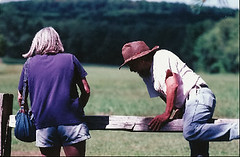
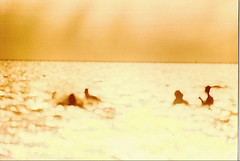
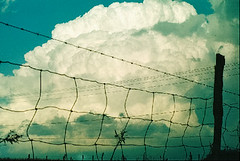
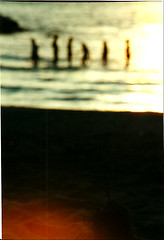
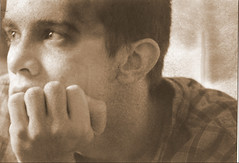
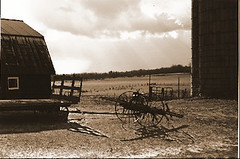
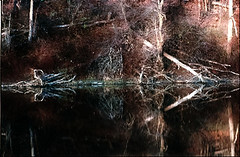






5 Comments:
johanna, I saw Je, tu, il, elle… a number of years ago and I am still struck by how rich the film is given that is seems so simple on the surface.
It speaks of the brevity of all such action and motivation, of the unimportance of all time -- except where it is spent in exploration of truth. This is true not only of Je, tu, il, elle…, and much of what Ackerman is about, but it speaks to contemplative cinema as a whole very well.
I almost think that when a director focuses so intently on the exploration of truth, then many of the typical aspects of narrative construction, what is often felt so necessary to most filmmakers, loses significance – including common filmic concepts of time. It seems to me cinematic time devoted to an exploration of truth will likely have significantly different characteristics compared to cinematic time devoted to a car chase or bank heist, for example.
The only other Ackerman films I’ve seen are Les Rendez-vous d'Anna (1978), Toute une nuit (1982), and Les Années 80 (1983). I have always thought it would a great project to do an in-depth study of her work.
Happy coincidence, my contribution is on Akerman's latest documentary. I haven't seen yours, it sounds excellent, I'll have to watch this very soon. This out of sync sound-image especially interest me. I wonder how she does that.
Thanks for your contribution and your support to the blogathon blog.
Are there more contemplative films by Akerman to add to the chronology listing?
cineboy: yes, the rich texture of this film resonates so well it's like it hasn't aged at all. i think she may have set it up not to age.
I feel similarly about the richly textured effect of the scene juxtapositions in Toute une Nuit. If you get a chance to, I'd also recommend watching her shorts which have been compiled at least on VHS as "Akermania" and are very much worth tracking down at any resolution, especially her first...wish we'd had that to watch at slumbe parties when I was a kid.
You may be onto something with the exploration of truth. I have a great admiration for how specific she keeps all the action in this film -- little truths that make it more real, rather than a grandiose search for philosophical reckoning that would be so hard to relate to. Eating sugar indeed.
Harry, I'll have to wait to read your contribution, arggh...i was just now able to comment on my own blog...but at first skim, it looks good.
She uses black-outs and narration, little more, to achieve the timeless effects. It's pretty neat. Also, I definitely think you should add D'Est to the list, if you haven't already. It's very good to watch with any Russion friends you may have who miss the old Russia, by the way...
Cheers.
I haven't seen D'Est (I'll add it then), but I saw De l'Autre Côté, with its long takes along the border, at night, a great documentary.
I'll have to try and find that -- thanks for the recommendation.
I also saw Hotel Monterey and thought it very creepy by turns -- it would fall under CC, though. It's just mostly static shots of a hotel that's about to be torn down, if you haven't seen it.
Post a Comment
<< Home